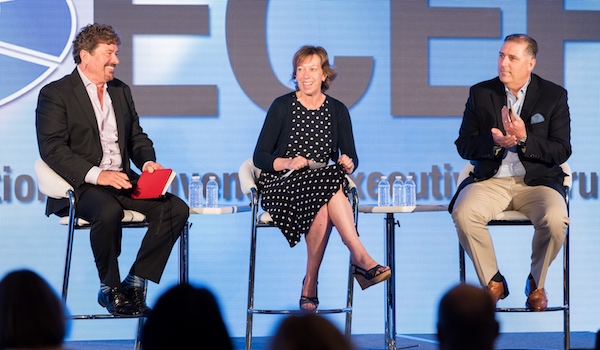Increased tech, marketing costs may dent trade show profits
Increased tech, marketing costs may dent trade show profits
- June 21, 2019 |
-
 WILLIAM EHART
WILLIAM EHART

ECEF panelists say organizers need to invest more in events, develop marketing around social causes to appeal to young attendees

Talking profits: From left, Rick McConnell of Informa Markets, Linda Gray Martin of RSA Conferences, and Dennis Smith of Messe Frankfurt.
Related content
As cities add meetings space, sites for association events continue to grow
Restaurant show sale could provide model for future deals
Sweet success: How NCA unwrapped greater show profits
The events industry is lucrative, but show organizers need to invest in ever more advanced marketing tools, enhance attendee experience and appeal to new generations.
"We have much more sophisticated marketing automation tools these days, and technology in general, to be able to mine attendee data and really drill down into what they want, need and what they expect," said Linda Gray Martin, director and chief of operations at RSA Conferences, which runs cybersecurity industry events.
"At the same time, we have more sophisticated event platforms, which allow us to serve up content and activities that match those attendee requirements," she told CEO Update.
"The trend is to increase the amount of money that's invested back into events in order to create these personalized experiences, to keep education moving forward and to keep the event industry moving forward," she said.
"What's really interesting is that our industry as a whole has matured to the point where events almost run like individual businesses or business units," she said. "With that comes the understanding of business intelligence and the needs of attendees, the importance of reinvesting back in the business."
Some of that investment should be in artificial intelligence, Martin said.
"Artificial intelligence is going to make it easier to match what the events offer with what an attendee wants," she said. "In essence, the events are going to be able to talk individually to the attendees so that they can get specifically what they need from the event quickly and efficiently."
Without more investment in personalization, show attendance will decline, she said.
But technology is not the only thing driving increased marketing costs.
Rick McConnell, president for North America of Informa Markets, said younger generations of attendees expect greater social commitment from show organizers. (McConnell and Martin were part of a panel on trade show trends at the Exhibition and Convention Executives Forum at the JW Marriott hotel in Washington, D.C., in late May.)
He pointed to companies like TOMS Shoes, which donates to a charity of the consumer's choice with every purchase.
Donating a couple of bucks per attendee to a cause or charity is not enough any more, he said at ECEF.
"(Causal marketing) has got to be embedded in your business model. Those are the kinds of things we're looking at more and more and I would highly encourage those of you who have the ability to influence those kinds of decisions to look at the business model.
"And if it doesn't have some sort of giveback element in it, we may be missing a very real opportunity. We may not be around in 10 years," McConnell said.
The third panel member, Messe Frankfurt President and CEO Dennis Smith, said reinventing shows and more closely aligning with sponsors could ultimately boost profits.
"What is the most profitable product that we promote?" Smith said. "I would say it's sponsorships, and I think realigning ourselves with our sponsors and talking to our key exhibitors, and discussing what their objectives are is going to create some new models for pricing. And I believe those are going to be more profitable."
Margins under pressure
Sam Lippman, president of Lippman Connects and organizer of the Exhibition and Convention Executives Forum, raised the issue of profits at the forum.
He later told CEO Update that show profits are at risk if producers fail to keep up with changing attendee and exhibitor demands.
"To remain relevant to both exhibitors and attendees, organizers are going to have to invest more in their events," Lippman said. "More in attendee marketing, more in exhibitor services and more in on-site benefits to both.
"Organizers will see their margins decrease as they invest more in their events," he said.
"I don't see soon enough the awareness that these very unusual profit margins are going to have to be adjusted downward," Lippman said.
"Unfortunately, people have short memories. Many events are at or exceeding pre-recession levels as far as size and profitability. It takes a very smart, strong individual to say when the cash is rolling in, ‘We need to invest more, we need to upgrade and we need to prepare,' but that's the best time to do it."
Lippman noted that nearly half of the show-executive attendees responding to his ECEF Pulse poll are increasing their marketing budgets.
"That's one indication that leadership is realizing that this stuff isn't guaranteed," he said. "The fact that you had a good show, a good convention, a good annual meeting, a good exhibition in 2019 does not mean it's going to happen in 2020."
Maximizing software tools
Marketing methods are becoming more sophisticated than some association marketing staffs can handle, said Kimberly Hardcastle-Geddes, president and chief account strategist at marking agency mdg. (Hardcastle-Geddes attended ECEF but was not on the panel.)
"The biggest factor is how complicated marketing is getting," she told CEO Update. "So much of it is becoming data driven and digital, and it's requiring a tremendous degree of coordination."
Many associations are using automation tools like Eloqua but not getting the most out of them.
"They're realizing as they're starting to use them that they're basically using about 20% of what the tools are capable of," Hardcastle-Geddes said. "So oftentimes, they're bringing us in as consultants to help them really maximize the investment that they're making in technology."
